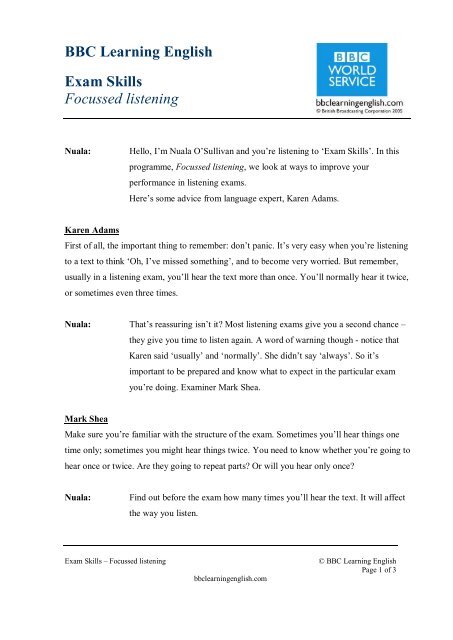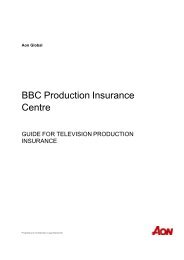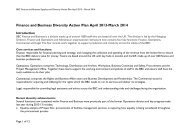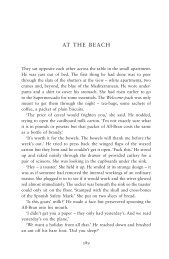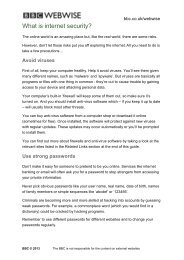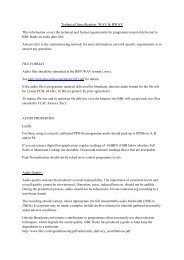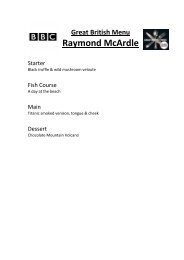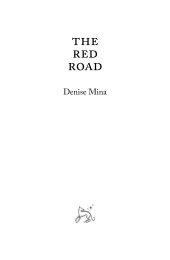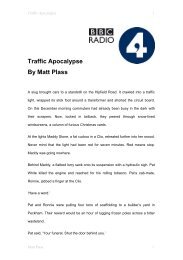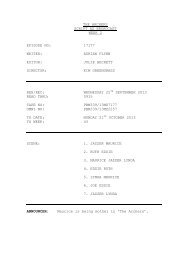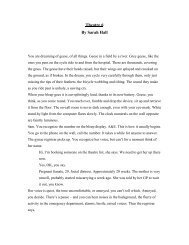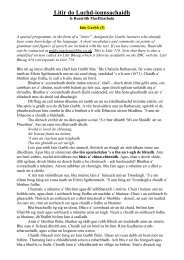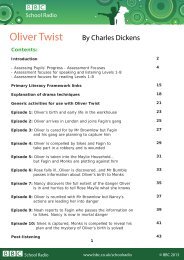2 Focussed listening - BBC
2 Focussed listening - BBC
2 Focussed listening - BBC
Create successful ePaper yourself
Turn your PDF publications into a flip-book with our unique Google optimized e-Paper software.
<strong>BBC</strong> Learning English<br />
Exam Skills<br />
<strong>Focussed</strong> <strong>listening</strong><br />
Nuala: Hello, I’m Nuala O’Sullivan and you’re <strong>listening</strong> to ‘Exam Skills’. In this<br />
Karen Adams<br />
programme, <strong>Focussed</strong> <strong>listening</strong>, we look at ways to improve your<br />
performance in <strong>listening</strong> exams.<br />
Here’s some advice from language expert, Karen Adams.<br />
First of all, the important thing to remember: don’t panic. It’s very easy when you’re <strong>listening</strong><br />
to a text to think ‘Oh, I’ve missed something’, and to become very worried. But remember,<br />
usually in a <strong>listening</strong> exam, you’ll hear the text more than once. You’ll normally hear it twice,<br />
or sometimes even three times.<br />
Nuala: That’s reassuring isn’t it? Most <strong>listening</strong> exams give you a second chance –<br />
Mark Shea<br />
they give you time to listen again. A word of warning though - notice that<br />
Karen said ‘usually’ and ‘normally’. She didn’t say ‘always’. So it’s<br />
important to be prepared and know what to expect in the particular exam<br />
you’re doing. Examiner Mark Shea.<br />
Make sure you’re familiar with the structure of the exam. Sometimes you’ll hear things one<br />
time only; sometimes you might hear things twice. You need to know whether you’re going to<br />
hear once or twice. Are they going to repeat parts? Or will you hear only once?<br />
Nuala: Find out before the exam how many times you’ll hear the text. It will affect<br />
the way you listen.<br />
Exam Skills – <strong>Focussed</strong> <strong>listening</strong> © <strong>BBC</strong> Learning English<br />
Page 1 of 3<br />
bbclearningenglish.com
Mark Shea<br />
It’s important to read the question before you hear the tape, so you know what to listen for.<br />
Are you <strong>listening</strong> for specific information, or is it more a kind of global understanding that<br />
will be important in answering the question?<br />
Nuala: Read the question very carefully. Know what you’re <strong>listening</strong> for. Are you<br />
Margaret John<br />
looking for specific details? Or more general points?<br />
Language teacher Margaret John has a really useful rule - it will make you<br />
focus your <strong>listening</strong>. Here’s a clue: it’s not just your ears that are important!<br />
Another golden rule that will really help you in a <strong>listening</strong> exam is to keep your finger on the<br />
question. Don’t be distracted by all that other language going around. So keep your eyes on<br />
the question. When you’ve heard the answer to that question, move straight to the next<br />
question, and put your finger on it, and pay attention to that and that alone. Don’t be<br />
distracted by all the other information going on around you.<br />
Nuala: Listening exams give you much more information than you actually need<br />
Margaret John<br />
for answering the questions. So use your finger to sort out what’s relevant.<br />
If you want to see what I’m talking about, look at a copy of a transcript, and you’ll find that<br />
there’s often six, seven, eight, even nine lines between one answer and the next. So the<br />
important thing to do is to put your finger on the question, and listen only for that question to<br />
be answered. You’ll find that you will pick it up that way.<br />
Nuala: Look at the question, put your finger on it, and listen only for the answer to<br />
that question. In some exams, you’ll have the chance to hear the text a<br />
couple of times. So, as Mark Shea makes clear, don’t waste this second<br />
chance.<br />
Exam Skills – <strong>Focussed</strong> <strong>listening</strong> © <strong>BBC</strong> Learning English<br />
Page 2 of 3<br />
bbclearningenglish.com
Mark Shea<br />
If you have the chance to hear things twice, try and form an opinion the first time you listen,<br />
and then the second time you listen you should be confirming that your guess was right the<br />
first time. Make sure that you do listen the second time, and don’t just think that you’ve got<br />
the answer right the first time round.<br />
Nuala: If you know you’ll be hearing the text twice, you don’t have to answer all<br />
Karen Adams<br />
the questions first time round. Karen Adams suggests this approach:<br />
Try to get the answers to the most obvious questions first time round, and then use the second<br />
<strong>listening</strong> to answer the more difficult questions, and to check your answers to the more<br />
obvious ones.<br />
Nuala: And now here’s a quick summary of the advice in today’s programme.<br />
Mark Shea<br />
If you have the opportunity to listen twice, make sure you listen twice; and make sure you<br />
know the format of the exam: are you going to hear once? Or are you going to hear twice?<br />
Margaret John<br />
What you have to remember is to keep your finger on the question. You try it, and you’ll find<br />
that you will improve your score by up to 30% almost immediately.<br />
Nuala: Good luck and good revising!<br />
Exam Skills – <strong>Focussed</strong> <strong>listening</strong> © <strong>BBC</strong> Learning English<br />
Page 3 of 3<br />
bbclearningenglish.com


